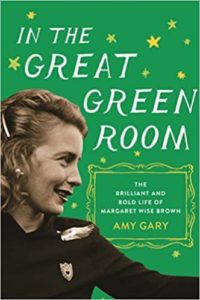After I decided to use Margaret Wise Brown as inspiration for both Children’s Book Club and this By Heart post, I decided to dedicate June to her — reading her biography, In the Great Green Room, and as many of her picture books as I could find at my library. It was a very good month. Even though it is summer.
There’s a joke that Texas only has three seasons: Almost Summer, Summer, and Still Summer. One of the things I like about Brown’s “Song of Summer” poem is that it mentions six months of warm weather.
Song of Summer
Here comes a bunny
The first to stray
Out of April
And into May.
And here comes a robin
The first to fly
Out of June
And into July.
Here are the fireflies
Last to remember
The end of August
And first of September.
And here comes a caterpillar
The last to creep
Out of summer
And into sleep
— Margaret Wise Brown
I’ve been fascinated with “the brilliant and bold life of Margaret Wise Brown” since I learned a bit about her in Bruce Handy’s Wild Things: The Joy of Reading Children’s Literature as an Adult. This new biography by Gary contains many unpublished poems by Brown. They’re so luscious they make me savor even this hot season.
Once Upon a Summertime
Once upon a summertime
A bug was crawling on a vine
A butterfly lit on a daisy
While a little bee
Buzzed himself crazy in a wild pink rose
And a child ran through the wet green grass
In his bare feet and wiggled his toes
— Margaret Wise Brown
Even though their backgrounds could not be more different, spending the month with Brown’s poetry has reminded me of a poet I spent time with last summer, current Poet Laureate Joy Harjo. Both break the rule of specificity — “redbird” or a generic “bug” rather than cardinal or grasshopper. But both poets have such an intimacy with nature that they make general words seem inviting.
“Song of Summer” moves not just through months but through a day. Bunnies awake at dawn and do their foraging until it begins to warm up. Robins are also morning birds, but their song can be heard from their tree roosts later on. Fireflies are an evening beetle of light. And the cocoon the caterpillars weave is so very like curling up for a long night’s sleep.
Brown loved to be outdoors — riding horses, swimming, biking, running, and even hunting. When she got her first book advance, she spent the entire check on a cart of flowers from a street vendor. She longed to grow up and write something for adults, something that would be taken seriously, but she couldn’t stop her flow of words for children. After her death, Goodnight Moon’s value was listed as $200 and the New York Public Library refused to carry it for twenty years. It has sold more than 48 million copies.
from What Will They Be?
Mary Madorn climbs in trees
Scratches her arms
And scratches her knees
Isn’t afraid of dogs or bees
Swims in crashing cold green seas
It’s a little hard at this time to see
What kind of lady brave Mary will be?
— Margaret Wise Brown
Brave Mary. Brave Joy. Brave Margaret.
https://soundcloud.com/megan-willome/song-of-summer-by-margaret-wise-brown
Your Turn
Did you memorize “Song of Summer” this month? If not, it won’t take long. Join our By Heart community and share your audio or video using the hashtags #ByHeart and #MemoriesWithFriends and tagging us @tspoetry. We also welcome photos of your handwritten copy of the poem.
By Heart for July
For the next By Heart gathering, July 24, we’ll learn “I Have Wrapped My Dreams in a Silken Cloth” by Countee Cullen, one of our new additions to Take Your Poet to Work Day, July 15. He’ll have his own introductory post soon.
I Have Wrapped My Dreams in a Silken Cloth
I have wrapped my dreams in a silken cloth
And laid them away in a box of gold,
Where long may cling the lips of the moth;
I have wrapped my dreams in a silken cloth.
I hide no hate; I am not even wroth
Who found life’s breath so keen and cold.
I have wrapped my dreams in a silken cloth
And laid them away in a box of gold.
— Countee Cullen
Photo by Sean McGrath, Creative Commons, via Flickr. Post by Megan Willome.
Browse more By Heart
“Megan Willome’s The Joy of Poetry is not a long book, but it took me longer to read than I expected, because I kept stopping to savor poems and passages, to make note of books mentioned, and to compare Willome’s journey into poetry to my own. The book is many things. An unpretentious, funny, and poignant memoir. A defense of poetry, a response to literature that has touched her life, and a manual on how to write poetry. It’s also the story of a daughter who loses her mother to cancer. The author links these things into a narrative much like that of a novel. I loved this book. As soon as I finished, I began reading it again.”
—David Lee Garrison, author of Playing Bach in the D. C. Metro
- Perspective: The Two, The Only: Calvin and Hobbes - December 16, 2022
- Children’s Book Club: A Very Haunted Christmas - December 9, 2022
- By Heart: ‘The night is darkening round me’ by Emily Brontë - December 2, 2022



Leave a Reply